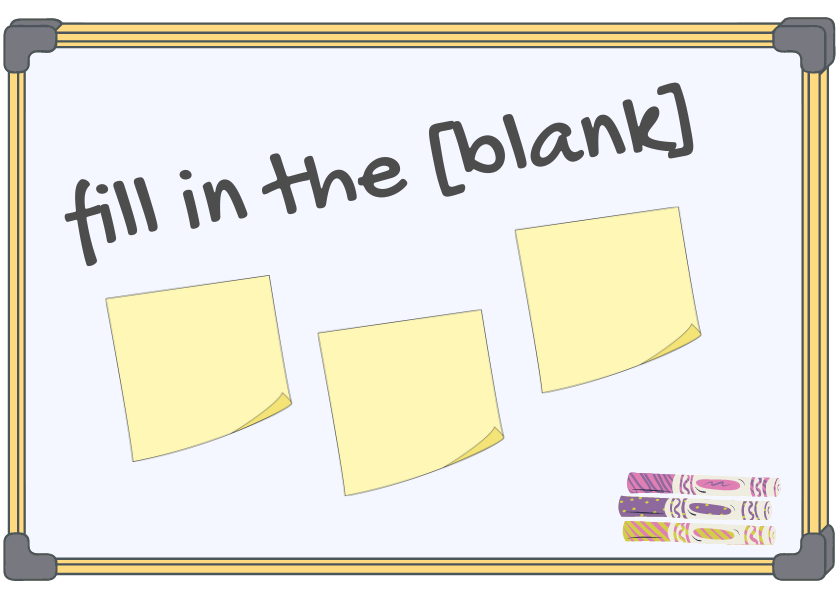A great way to [objective] is to [idea]
A great way to write a newsletter is to share a tool people can use 😛
MadLibs is a fill-in-the-blank game. It was invented in 1953 by Leonard Stern and Roger Price. The game was inspired by a conversation they overheard at a restaurant. A talent agent and an actor were arguing, and the actor wanted to "ad-lib" the upcoming interview. The agent responded that ad-libbing would be "mad".
This conversation sparked the idea of creating a game where players provided random words to fill in blanks in a story, resulting in humorous and often nonsensical tales. The game was initially self-published in 1958 under the name "Mad Libs" and quickly gained popularity.
Of course these days, a very popular, well known use of the fill-in-the-blank framework is the game Cards Against Humanity. Though we’ve both found ourselves crying with laughter while playing that game, it isn’t the first thing that leaps to mind when we think ‘workplace appropriate’.
That aside, there are many great ways you can leverage mad libs in your professional lives.
Composition
Writing can be difficult. Some people find that they didn’t learn how to write well at an early age and that the Internet era has masked that fact. Others, for whom English is a second language, can find themselves at a disadvantage when working in organizations with English as the predominant language.
Even without these challenges, many of us suffer from blank page syndrome wherein we simply aren’t inspired or find our words jumbled by neuro-divergent brains when we try to get started. Mad libs can be a great way around these obstacles.
Coaching For Performance
We’ll start with some mad libs that are great for helping you and the people you coach establish clear goals, success criteria and risk management for their work…
I'm having difficulty with [blank] and I believe it’s because [blank].
In the next quarter, I aim to [blank] by [blank].
I'd like to take on more responsibility in the area of [blank], as I believe I could [blank].
A concern I have about the goals we’ve set is [blank].
Coaching For Growth
Next we have a smattering of mad libs that help people to focus on how they will become harder, better, faster, stronger 🎵…
In the next [timeframe], I would like to [verb] my skills in [skill].
My long-term goal is to become a [position] and contribute to [company/industry] by [action].
I'm particularly interested in developing my [skill] so that I can [outcome].
I'm looking to [verb] myself by taking on [challenge].
I'd like to take on more responsibility in the area of [blank], as I believe I could [blank].
My biggest opportunity for growth lies in [area/skill/behavior].
Feedback Conversations
Feedback is also something that can be difficult to ‘get started’ with. Consider one of these…
[name] is at their best when they are doing [activity/task/work].
[name] is a good team member because they [describe].
If I could ask one thing of [name], it would be [challenge to improve].
My biggest concern about the new policy is [blank], especially when it comes to [blank].
The thing I like most about the new policy is that I will be able to [blank] / it will allow us to [blank].
I notice on [when], you [factually describe their action/behavior], can we talk more about that?
Ideation / Problem Solving
Of course, mad libs are in their element when the very purpose of a gathering is to emit new ideas…
If we could do one thing with this product, I’d want it to be [idea].
If we changed [feature] within our service, we could increase [X] by [Y].
We could likely improve our product 1% if we [idea].
Customers would be more engaged with our product if we [idea].
Retrospective Sessions
It’s important that retros feel blameless and productive. Mad libs can really help out here…
I think it would be [blank] if our team could practice [blank] more often.
I think it would be [blank] if our team could [blank] less often.
I feel [blank] when [blank] happens in our team meetings.
Breaking The Ice
When faced with new colleagues and a culture you don’t know a lot about, it can be helpful to have some starter phrases like…
I joined [company name] because of [reason].
I’m most excited to [project/task etc].
Ask me anything about [topic] / I could talk all day with you about [topic].
In fact, we’ve leveraged the mad lib framework with great success for our Personal User Manual (PUM) template. You’ll have received a link to our PUM template (along with some other freebies) when you subscribed to this newsletter. If you aren’t subscribed, now is a great time to do that!
We hope you’ll think about where a mad lib could be helpful in generating opportunities for engagement, accessibility and creative thinking in the workplace.
If you’d like help with this topic or any other, as always, drop us a line.


